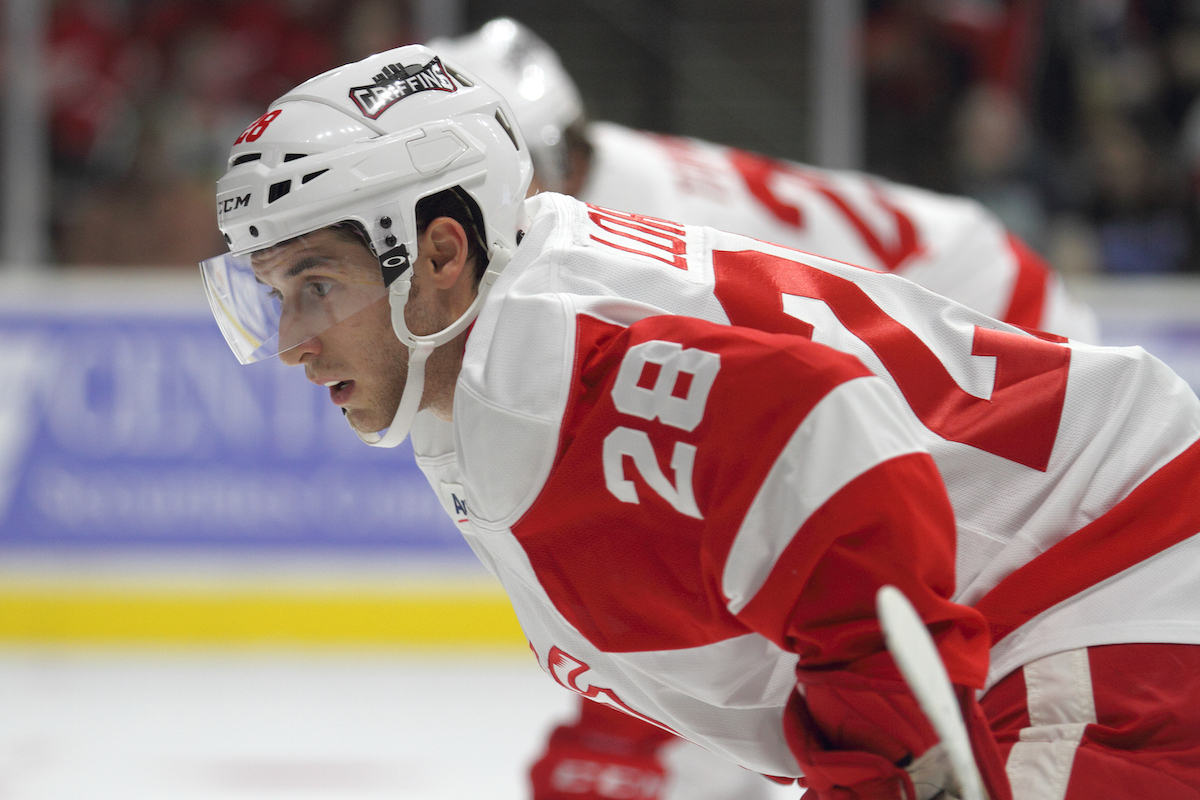By Jason Pearson | AHL On The Beat
For second-year professional Matt Lorito, the adjustment to the Grand Rapids Griffins has been nothing short of smooth and efficient. Off the ice, he avoided any potential hassles by moving in to his new downtown place before opening night. On the ice, he has proven his worth as a top-six forward for the Griffins by displaying not just his refined scoring touch but also his adaptability, enabled by both his keen hockey sense and innate skating ability.
After leading the Albany Devils – who, by the way, posted the third-best record in the AHL – in points and assists during his rookie campaign in 2015-16, Lorito landed with the Detroit Red Wings organization via the free agent market this past summer.
In many instances, joining a new organization, let alone jumping from rookie to sophomore season and being asked to play more center than in the preceding year, can contribute to a delay in immediate production. Not in Lorito’s case.
The 5-foot-9, 171-pound centerman started his Griffins career on a four-game assist streak, and his six points through the season’s first five games were the most by a player to begin his Grand Rapids career since 2011-12.
So where can these stat lines be attributed? A case could be made that part of it is traceable to receiving significant power play minutes or to playing on the same line as Anthony Mantha, whose torrid start to the season included six goals in the first four games. Both of these rationalizations could play a role into this season’s early success, but neither could explain why Lorito’s successive transitions from Brown University to Albany to Grand Rapids have all been seamless, at least from a statistical standpoint.
Lorito led Brown in scoring during two of his four seasons on campus before ranking sixth among AHL rookies in production last year, and he’s now on pace for upwards of 60 points with the Griffins.
“I think my hockey sense is a big part of what’s gotten me here,” he said. “Being able to understand the game and how it’s played at each different level and being able to figure out how to produce at every level has been a key strength for me.”
One of those vague, coach-speak type terms, “hockey sense” can be tricky to nail down with a reliable definition. Lorito, though, has a finger – or perhaps a stick – on it.
“There’s a lot of ways to define hockey sense, but I think it’s a combination of being able to understand the game and what needs to happen when you’re on the ice and where you need to be,” he says.
Knowing where he needs to be and how best to get there is traceable to another attributable trait factoring in to his smooth transitions: skating ability.
Something that he’s continually developed ever since his dad first put him on skates at the ripe age of two, skating is a significant part of Lorito’s skill set. The importance has been amplified, given the way the game has evolved in recent years.
“To see where the game’s gone now, it’s where me and my dad kind of hoped it would go,” Lorito says. “When we used to watch, it was a lot of clutching, grabbing, holding, a lot of big guys and there wasn’t a lot of room for guys like me in the league. The way it’s going now, there’s more opportunity than ever for smaller guys that can skate and make plays.”
Speaking of making plays, Lorito by himself accounts for nearly a tenth of the team’s offensive production thus far. But, to the fans in the stands, that may not be readily apparent due to his pass-first mentality.
Lorito’s dry-land unselfishness, which he credits to his upbringing in Oakville, Ontario, is dually manifested when he has the puck on his stick, and his unique natural knack for dishing the puck only deepens the matter.
“It’s not so much seeing the pass, it’s also putting it there with the right pace or there’s a lot of little things that go into a pass that probably get overlooked,” Lorito said. “For me, it’s just working on it at practice, passing the puck flat every time, making sure I’m hitting the tape every time. Little things like that over time become natural.”
Lorito is not one to take any of that instinctive ability for granted, often exhibiting his genuine love for the game by spending extended time after practice working on his craft and habitually being one of the last off the ice.
Like many new professionals, Lorito is quick to note the aspects for improvement.
“There’s still some areas I can improve on in my own zone but overall I think just trying to work on the little things every day,” he says. “I still work on my skating and shooting. My shot is something I’ve worked on a lot over the summers and it’s definitely gotten better, but there’s still so many ways to shoot the puck.”
No doubt Lorito’s hockey sense and skating will provide steady building blocks as the Red Wings prospect presses on in his sophomore campaign.






































